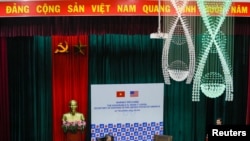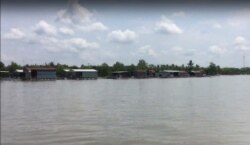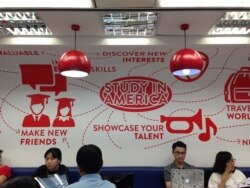Vietnam got a double dose of waterway diplomacy from the United States last week.
In the north, in Hanoi, U.S. Defense Secretary Mark Esper announced Wednesday his nation would provide Vietnam with a second coast guard cutter ship to use in the South China Sea, where it has a dispute with China.
In the south, in an unrelated event around the same time, a U.S. consul general toured the Mekong Delta in a dinghy as part of a series of visits related to education, environment, and culture.
The two separate events, one a display of hard power, the other a show of soft power, indicate the different ways Vietnam and the United States are getting closer, decades after fighting an exhaustive war.
U.S. consul general in Ho Chi Minh City Marie Damour spent three days in the nearby delta province of An Giang, culminating in the opening of an American center. Such centers already exist in Hanoi and Ho Chi Minh City, where they have become like popular watering holes. Vietnam’s young people hang out at these centers for everything from writing classes to dialogues with visiting jazz musicians to film screenings. They are the quintessence of soft power.
“The American hangout is a testament of our shared vision and marks an important milestone in the already strong relationship,” Damour said at the center’s opening at the University of An Giang.
It also marked the first such center outside Vietnam’s megacities. The location matters, considering two-thirds of citizens live in rural areas. Rather than skewing ]to urban areas, the change shows the U.S. relationship is seeping all across the Southeast Asian nation.
“The future of Vietnam and the U.S.-Vietnam relationship will be determined not only by Hanoi and Ho Chi Minh City, but in all 63 provinces and cities of Vietnam,” Damour said.
Her tour included visits to local Cham Muslims at the Mubarak Mosque, to discuss human trafficking with border officers, and to discuss agricultural trade with provincial leaders.
Trade is a conspicuous example of the bilateral relationship. Vietnam and the U.S. have had diplomatic relations for less than three decades. However in that time the U.S. became Vietnam’s biggest market for exports, and Vietnam became one of the fastest growing markets for U.S. agricultural products. The communist nation also exports agricultural products, to the U.S. and elsewhere, with the Mekong Delta being a key rice basket and farming region.
Thucydides Trap
As for defense, Hanoi and Washington do not have a military alliance but share worries about the increasing power of Beijing. In announcing another patrol boat handover Esper said the U.S. is “providing Vietnam the capabilities it needs to protect its sovereignty and natural resources.”
Esper even brought up Greek historian Thucydides during his speech to the Diplomatic Academy of Vietnam last week. The once-esoteric Thucydides is now regularly name-dropped in geopolitical circles. More than two millennia ago he wrote of the war between Sparta and the rising power of Athens. In this millennium a Harvard historian compared those powers to the U.S. and China, saying most historic rivalries between an established and a rising power resulted in conflict, what is called Thucydides’ trap.
As the top U.S. military official, Esper pinned the rivalry on China. First he focused on how a rising power — Athens — used “aggression” and “might” to bully a smaller state. Then he turned to the South China Sea territorial dispute, where he said smaller states like Vietnam face “harassment.”
“China’s unilateral efforts to assert illegitimate maritime claims threaten other nations’ access to vital natural resources,” he said, “undermine the stability of regional energy markets, and increase the risk of conflict.”






